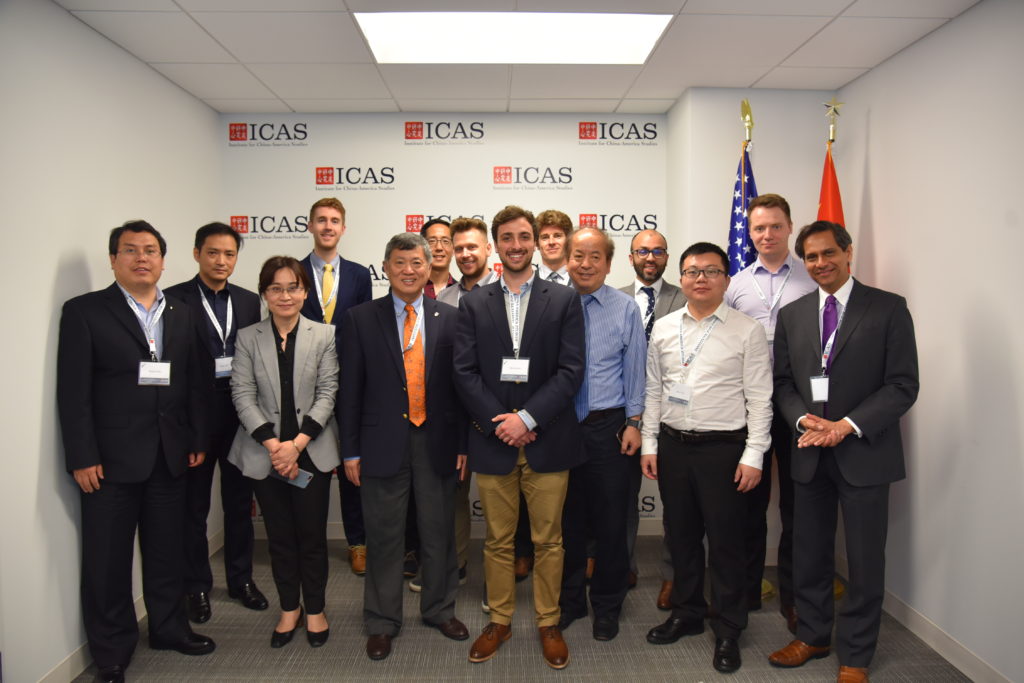
Introduction:
On April 26, 2019, the Institute for China-America Studies (ICAS) held its first China-U.S.-Canada Trilateral Relations Roundtable Dialogue. Dr. Nong Hong, the executive director of ICAS, opened the event by stressing the importance of the day’s discussions in bridging the gap in dialogue between the United States, Canada, and China. In addition to bringing into the fold the Canadian perspective, the endeavor of the event was to tease out stimulating ideas that look beyond the immediate challenges of the day facing China-U.S.-Canada relations and develop longer-term horizons that could propel the relationships forward in the spirit of healthy competition.
In order to maintain a balance of perspectives, each panel was composed of six participants (two Chinese, two U.S., two Canadian). The topics that were discussed in each panel were as follows:
- Panel 1: Traditional Security: Maritime Security, Politics, Economics, and Strategic Military Presence
- Panel 2: Non-Traditional Security: Conflict and Cooperation in Energy, Technology, Education, and Culture
The day’s proceedings were opened with a set of introductory remarks by ICAS’ Advisory Board members, Dr. Shicun Wu, President, National Institute for South China Sea Studies (NISCSS) and President of the ICAS Advisory Board, Dr. Gordon Houlden, the Director of the China Institute at the University of Alberta, and Dr. Yawei Liu, Director of the China Program at the Carter Center. Each Advisory Board members touched on the perilous juncture at which the trilateral relationship stands today. In this regard, they agreed with Dr. Hong about the importance of this novel trilateral dialogue format and expressed enthusiasm for the upcoming discussions.
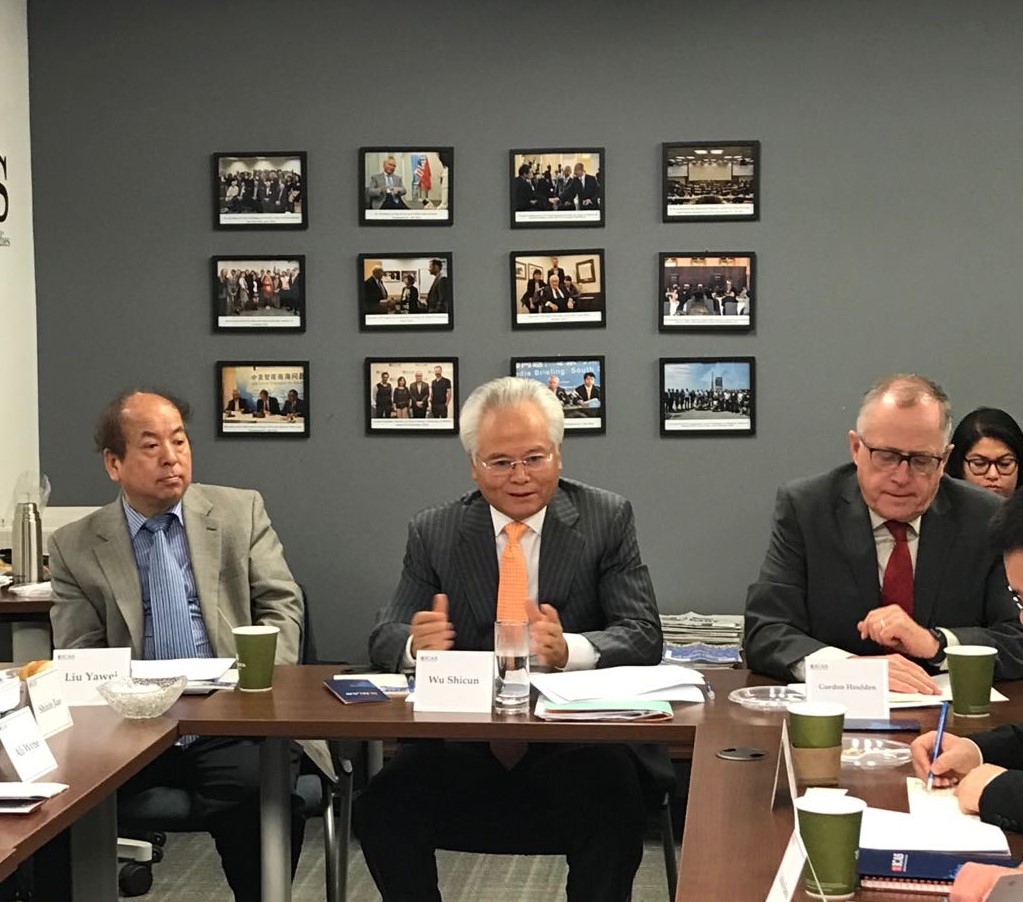
Summary of Panel 1:
Dr. Suisheng Zhao, Director of the Center for China-U.S. Cooperation at the University of Denver, served as the moderator for the first panel. He steered the discussion towards the key question: what are the primary issues, and underlying causes, that have triggered tension in U.S.-China relations and what is Canada’s role between these two countries?

The panelists from the United States discussed the multifaceted nature of competition between the U.S. and China, which has grown in leaps and bounds in recent times. A key cause of the deterioration in relations has been the Trump Administration’s unilateral and harsh policies towards China. That said, there are deeper structural dynamics at play which make win-win cooperation a difficult proposition to realize. A key idea put forth by the U.S. panelists was that nature of U.S-China competition in the post-Cold War order is markedly different from U.S.-Soviet Union competition of the Cold War era. That era was characterized by stark bipolarity and defined choices by countries in terms of which superpower they wished to line up with. By contrast, the post-Cold War order is characterized by a far greater degree of fluid multipolarity and countries are more hesitant in choosing either the U.S. or China. Countries, in fact, would prefer to work together with both the U. S. and China because of the economic and security benefits accruing from a good working relationship with each Power.
The Chinese panelists shared their thoughts on the current relationship between the U.S. and China. Sharing the U.S. panelists’ view of the approaching multipolarity, they stressed that while China’s power is indeed continuously growing, the U.S. is already a well-established developed power. As such, the U.S. should practice self-restraint during this tense period in ties and find ways to coexist peacefully and productively with China. It should also allow development space for China to seek out economic growth on lines that are more aligned with its interests and desires.
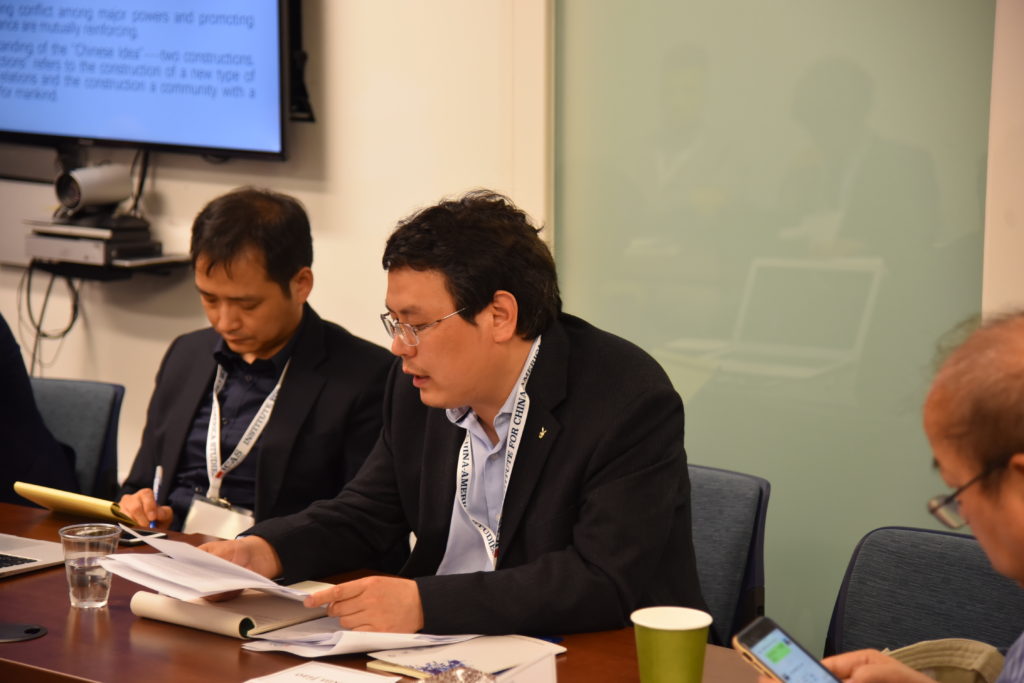
The Canadian panelists provided a valuable perspective, given their vested interest in seeing bilateral and trilateral ties among the three parties flourish. They admitted to the tense state of three-way ties and sought, in part, to referee the quarrels that have mired U.S.-China ties. The Canadian panelists spoke in some detail on the topics of military capabilities and technology in relation to the tensions between the two countries. They noted that although the People’s Liberation Army is generally opaque in its capabilities, it is more transparent in its objectives than it is given credit. The Chinese Defense White Papers clearly lay out many of these objectives. Furthermore, China should be considered a Great Power, as it will soon have the world’s second-largest navy. All Great Powers seek to become maritime powers in order to secure trade routes and expand their influence in the world. The Canadian scholars also sought to address the uneasiness elicited by China’s ramped-up mergers and acquisitions worldwide in the technology space. The motivations behind these acquisitions are not-too-dissimilar from the motivations of other enterprises that desire to increase their market share within an industry, they noted. Additionally, much of the fear surrounding China’s joint ventures and technology research and development is not always warranted. Regarding R&D, it was posited that despite commonly held beliefs, China actually has fairly strict IP laws and pays some of the world’s largest royalty fees for intellectual property rights.
Summary of Panel 2:
Sourabh Gupta, a Senior Fellow with ICAS, served as the moderator for the second panel. Leading into the panel, Sourabh noted that in the realm of security, politics and economic issues, the battle lines are already drawn. However, on other issues, such as non-conventional security, people-to-people exchanges, and even technology flows, things are more of a Pandora’s box – things that can go uphill or downhill from here.
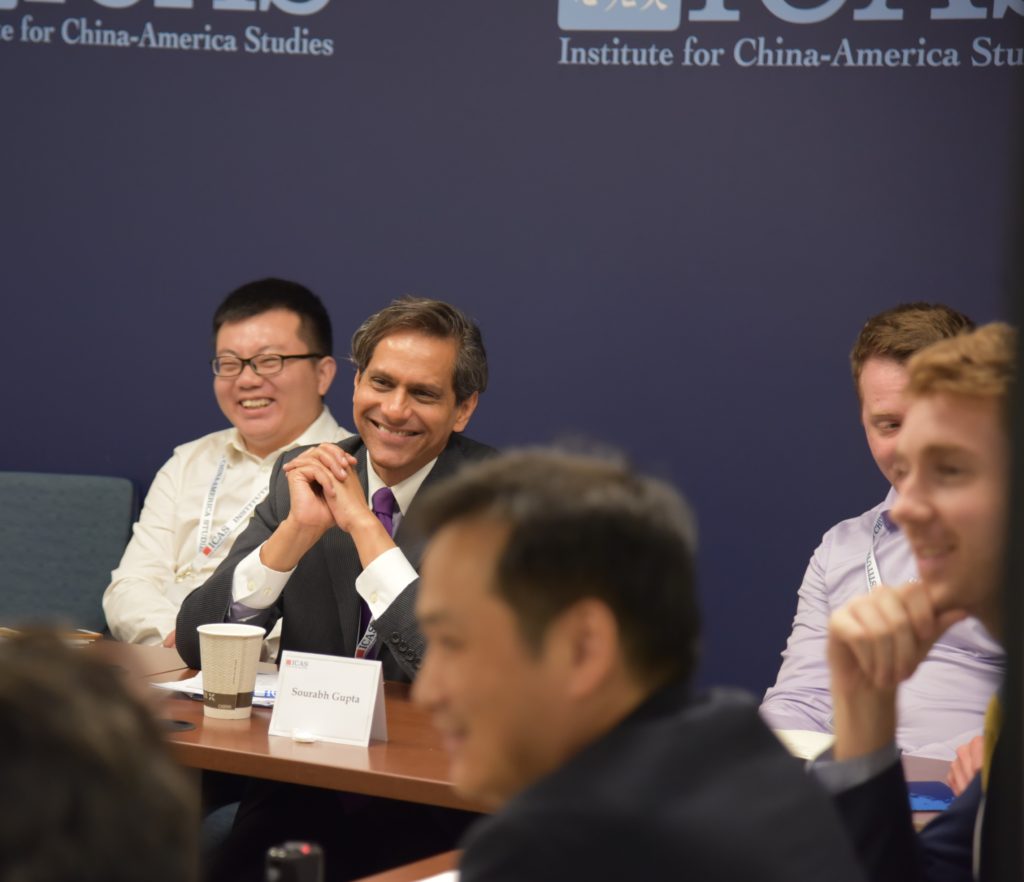
The American panelists were of the view that potential cooperation between the U.S. and China is possible, and certainly desirable, across a number of transnational issue areas, including cooperation in the area of science. Research collaborations between American and Chinese scientists are at an all-time high currently, outnumbering all other cross-national collaborations. However, these are dark clouds hovering above cooperative science and technology exchanges, given the growing concern in the U.S. that this could lead to unwanted technology transfer or theft. In particular, China’s ‘Thousand Talents Program’ in which Chinese government agencies offer ethnic Chinese scientists working outside of China additional research funding, is a source of concern. There are suspicions that it may be a mask for unauthorized Chinese intellectual property transfer. As such, U.S. science agencies including the prestigious National Institute of Health, have recently put researchers’ international ties under increasing scrutiny – particularly those with ties to Chinese institutions. While the U.S. needs to be cautious with regard to how it polices its science and technology ecosystem, it is also incumbent on the Chinese side to provide comfort to the U.S. that bilateral S&T cooperation is not a channel or cover for illicit gains. Regarding the U.S.’ opioid crisis, U.S. panelists observed that the participation of China’s law enforcement forces is crucial in resolving such opioid trafficking to the U.S. They suggested China cooperate with the U.S. and target Chinese labs that ship opioid to the U.S. They also provided a look into the illicit supply chains and how to target bad actors in both countries. However, as long as opioid demand in the U.S. remains high, it is highly unlikely that supply from China can be cut-off entirely.
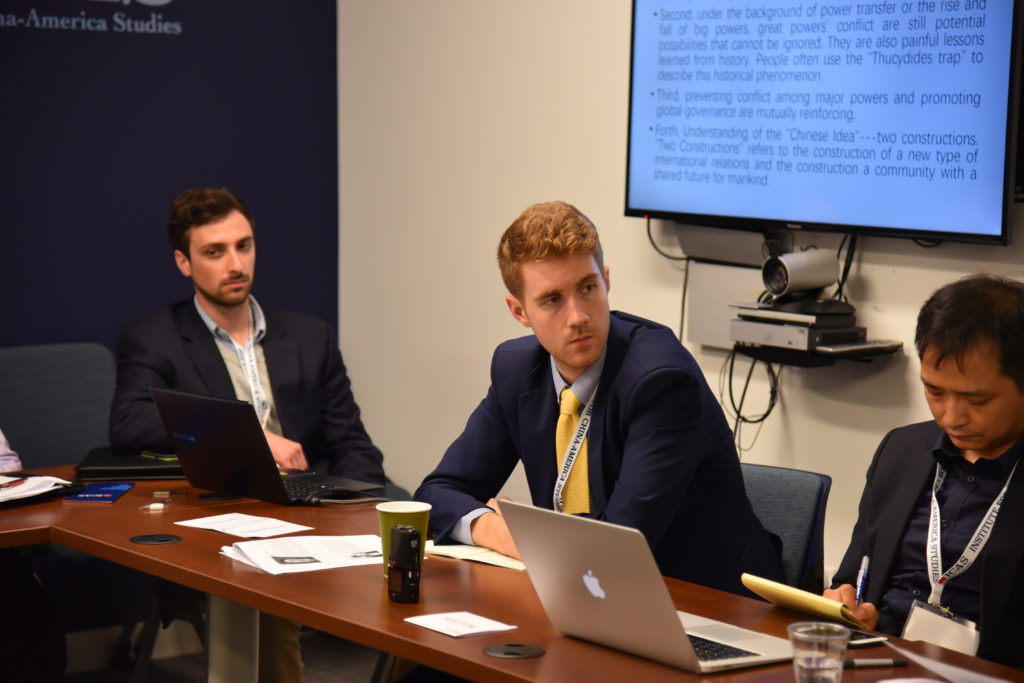
The panelist from China touched upon the subject of Chinese multilateral diplomacy and China’s role in the international order, especially within international institutions and organizations. The necessity of moving away from the traditional model of international relations, which has a “zero-sum” political approach, to one characterized by a “community with a shared future” was emphasized. In the Chinese view, transnational challenges and non-traditional security threats, such as environmental degradation, pandemics, marine waste, etc. are, by their very definition, transnational and beyond the capacity of any one country or set of countries to manage – let alone resolve. As such, China believes that countries are all in the same boat together and regardless of whether the country is developing or developed, a global community spirit is called upon to tackle these pressing global challenges.
Last, but certainly not least, the Canadian panelists spoke on the China and intellectual property rights (IPR) issue and in some detail particularly on the arrest and detention case of Huawei’s Meng Wanzhou. In their view, the Canadian public is well disposed towards China. They care more about economic relations with China and favor a free trade agreement with it. Although the Canadian public does worry about China’s alleged “intellectual theft” regarding technology development, China still remains a vital market to Canada, which seeks to reduce dependency on the U.S. Moreover, the Canadian panelists suggested that Canada is generally optimistic about working with China on global issues such as climate change. China’s heavy-handed approach following the Meng Wanzhou arrest and detention could however sour Canadian public opinion towards China. In the panelists’ view, this case involving the extradition of Meng has the potential to drag on for a long period of time – potentially up to 7-10 years before the appeals process is finally exhausted. That said, there is a roughly 90 percent chance that the extradition request will be successful. The real measure of the Huawei case for Canada though is not about the trade repercussions; rather it is about how Canada approaches future extradition cases that are essentially a proxy battle between the two Great Powers as well as how it navigates its ship of state as the U.S. and China increasingly get locked in a competitive and distrustful relationship.

